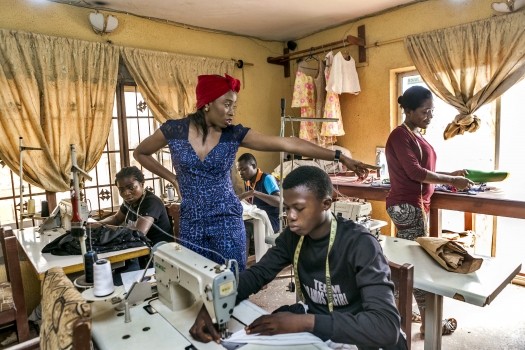
Fashion designer Ejiro A. Tafiri, 28, and her team in their workshop in Lagos, Nigeria. Photo: Panos/A. E.
Ahead of the goal of gender equality, increased political participation of women and economic empowerment lies an arduous journey for women and girls in Africa.
But despite the many challenges they face in attaining gender parity in all spheres, there is a glimmer of hope: more girls are going to school in Africa today and more women are starting to claim their place in positions of leadership than was the case two decades ago.
Although it is still a work in progress, and girls still need to be kept in school to attain up to college education and not be married off early, African women are benefiting from a formal education and are determined more than ever to create wealth for themselves, propel other women into financial independence and consequently make their contribution to the economy.
One of the roads most travelled by women and girls to escape unemployment and attain a sustainable level of economic freedom is the road of entrepreneurship.
According to the 2015 World Population Prospects, a report by the United Nations Department of Economic and Social Affairs, there are more than 161 million young women between 18 and 34 years in Africa currently. Since there are not enough jobs to absorb all of them, a small percentage have ventured into independent business and with the necessary support, many more could still take the same route.
Because gender inequality deprives countries of full development potential, the participation and contribution of young women in creating viable business ventures is crucial if the continent has any hope of implementing the African Union’s Agenda 2063, a 50-year development framework for the continent.
At only 28 years of age, Ngozi Opara, founder and chief executive officer of NZO Beauty, has built a huge online business around hair extensions and owns a hair salon in Washington DC, US.
In an interview with Africa Renewal, she acknowledged that her training in finance, alongside funding opportunities, has helped young women like herself to build solid enterprises. She said she wanted to offer unique and innovative products to the huge market at home.
“My educational background is in finance and accounting and these helped me become a problem solver, numbers savvy, and an outside-the-box thinker,” she says. “In business, these are all qualities and characteristics that help you grow and sustain your business.”
Although she thought she was equipped with entrepreneurship skills, navigating the business world in Africa and Asia proved to be much more challenging than expected.
“There are many challenges associated with being a young African businesswoman. My industry is male-dominated, yet black women are the primary consumers, so I am a threat to them,” said Ms. Opara, describing her experience while marketing the flagship brand of her business—heat-free hair.
Gender activists say that without legal frameworks to protect girls and young women from patriarchal structures that shut them out of economic development, women will always be disadvantaged, be it in business or employment. In some communities women are not allowed to own land, let alone use it as collateral to get a bank loan.
In sub-Saharan Africa, gender gaps in the labour market reduce the gross domestic product per capita by nearly 9%. But those gaps are narrowing as women’s labour force participation rate in the region has been steadily rising. Between 1990 and 2013 participation increased from 59% to 64%, according to the Progress of The World’s Women 2015-2016 report. Although this is a small increase, young African women are beginning to take the opportunities offered by entrepreneurship and move into business.
Meanwhile, organisations looking to fill gender unemployment gaps have started to establish platforms that would educate, mentor and support young African women to grow and sustain viable business ventures in various fields.
An example of one such company is She Leads Africa, a female-led pan-African start-up based in Nigeria. Founded by two young West African women, Yasmin Belo-Osagie (Nigerian) and Afua Osei (Ghanaian), the organization provides training and mentorship opportunities to help young women build successful careers in business.
She Leads Africa provides intensive business training boot camps called ‘SheHives’, offering pitch competitions to help women acquire funding for their businesses in major sub-Saharan African cities such as Lagos, Johannesburg and Accra, as well as New York and London. They also offer free access to online articles and live-streamed webinars where women worldwide can join in, receive free training and get their business questions answered.
The organization, albeit young, has trained and mentored more than 200,000 women and girls in over 30 African countries.
Opportunities for women and girls to thrive in their careers are crucial to the advancement of women and their potential contribution to the African economy.
To boost tools and policies needed for young women to thrive, governments and the society need to do more to promote gender equality in all spheres of life, a process that is painfully slow at the moment. If progress remains at the current pace, it will take about 50 years to achieve gender parity in parliament, and 80 years to achieve equality in economic participation, according to UN Women, the United Nations agency that promotes gender equality and the empowerment of women.
For women and girls, being able to make significant contributions to their economies means more than being responsible citizens. It means the ability to choose one’s path in life, to create wealth and to grow.
Source:African Renewal
Comments
Post a Comment